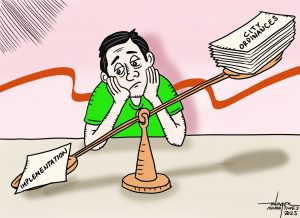By Herman M. Lagon
At the recent graduation at West Visayas State University (WVSU), Dr. Nordy D. Siason, Jr. shared a message that reached beyond the usual graduation excitement. He stressed that the duties of scholars go beyond personal achievements to include giving back to society. His talk focused on the ideas of “alkansiya” and “scholarship for service,” urging us to think about how education can help build a just society.
Dr. Siason’s rise from a modest fishing village to leading the Iloilo State University of Fisheries Science and Technology (ISUFST) shows us how education can lift entire communities. In his speech, he highlighted a crucial but often overlooked role of scholars: to use their knowledge ethically to advance social justice.
Today, as the divide between the rich and poor grows, the role of educated individuals is more critical than ever. It is not enough to excel in school; a true scholar must use their knowledge to improve society. Dr. Siason used the metaphor of “alkansiya”—saving and sharing knowledge and resources to assist others—to underline this point.
The idea of “scholarship for service” challenges graduates to look beyond typical career paths. It is about using academic and professional skills to solve societal problems, aligning with the Ignatian call to be “men and women for and with others,” which prioritizes the common good over personal success.
Dr. Siason shared personal stories showing how combining personal character with professional skills can lead to significant impacts. This message is vital in today’s competitive world, where the drive for academic success often overshadows the development of essential virtues like compassion, integrity, and empathy.
Moreover, promoting a service mindset among scholars isn’t just noble; it’s a practical way to help society grow. Institutions like WVSU foster a cycle of positive change, enriching communities and turning education into a tool for social transformation.
This philosophy of education invites both current students and alumni to consider their roles within their communities. Are they just absorbing knowledge, or are they also contributing to the greater good? Dr. Siason’s speech encourages us to see education as a privilege that comes with the responsibility to serve.
Furthermore, focusing on “scholarship for service” does not lessen the importance of personal success. Instead, it expands and transcends the definition of success to include the impact one has on others’ lives—a crucial shift in a world where social injustices continue.
Dr. Siason’s words remind us that the way to a fairer society is paved by those who use their education to help others up. This approach not only benefits the individual but also strengthens society as a whole.
Reflecting on Dr. Siason’s speech, it is clear that the future of education should align with values of justice and service. Universities and colleges have a chance to lead this effort, shaping students not just into scholars, but into community leaders ready to address today’s challenges.
WVSU graduates, inspired by Dr. Siason, are now equipped to both excel personally and drive societal change. This dual role is not just an academic goal but a moral duty. As they start their journeys, the concepts of “alkansiya” and “scholarship for service” will hopefully guide them to use their abilities for the good of all.
***
Doc H fondly describes himself as a ‘student of and for life’ who, like many others, aspires to a life-giving and why-driven world that is grounded in social justice and the pursuit of happiness. His views herewith do not necessarily reflect those of the institutions he is employed or connected with.

